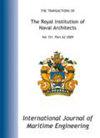HUMAN FACTORS ON OFFSHORE SUPPLY VESSELS IN THE NORWEGIAN SEA – AN EXPLANATORY SURVEY
IF 0.6
4区 工程技术
Q4 ENGINEERING, MARINE
引用次数: 0
Abstract
A survey of human factors on two state-of-the-art offshore supply vessels (OSVs) operating in the Norwegian Sea was performed by means of questionnaires. The purpose of the study was to examine whether human factors had been adequately addressed in ship design, how they were regarded by the crews, and whether design decisions were believed to have an effect on incidents on-board. The concept of human factors in ship design was operationalised into eight dimensions: habitability, workability, controllability, maintainability, manoeuvrability, survivability, occupational health and safety (OHS), and system safety. Inferential statistics were applied in order to draw conclusions, including means comparisons and multivariate regression analyses. The results show that human factors were given significant importance in the ship design. The level of accomplishment of human factors differs from one dimension to another. The highest satisfactory dimension was OHS and maintainability was the lowest, but still considered adequate. Design is revealed to have an impact on human factor ratings. Further, OSV design and human factor ratings are identified as having effects on particular incidents on board.挪威海近海补给船的人为因素——一项解释性调查
通过问卷调查的方式,对在挪威海作业的两艘最先进的海上补给船进行了人为因素调查。这项研究的目的是检查在船舶设计中是否充分考虑了人为因素,船员如何看待这些因素,以及设计决策是否被认为对船上事故有影响。船舶设计中的人为因素概念被操作为八个维度:可居住性、可操作性、可控性、可维护性、可操纵性、生存性、职业健康与安全(OHS)和系统安全。应用推断统计学得出结论,包括均值比较和多元回归分析。结果表明,人为因素在船舶设计中具有重要意义。人的因素的成就水平因维度而异。最令人满意的维度是OHS,可维护性最低,但仍被认为是足够的。设计对人为因素评级有影响。此外,OSV设计和人为因素评级被确定为对船上特定事件有影响。
本文章由计算机程序翻译,如有差异,请以英文原文为准。
求助全文
约1分钟内获得全文
求助全文
来源期刊

International Journal of Maritime Engineering
ENGINEERING, MARINE-
CiteScore
1.20
自引率
0.00%
发文量
18
审稿时长
>12 weeks
期刊介绍:
The International Journal of Maritime Engineering (IJME) provides a forum for the reporting and discussion on technical and scientific issues associated with the design and construction of commercial marine vessels . Contributions in the form of papers and notes, together with discussion on published papers are welcomed.
 求助内容:
求助内容: 应助结果提醒方式:
应助结果提醒方式:


